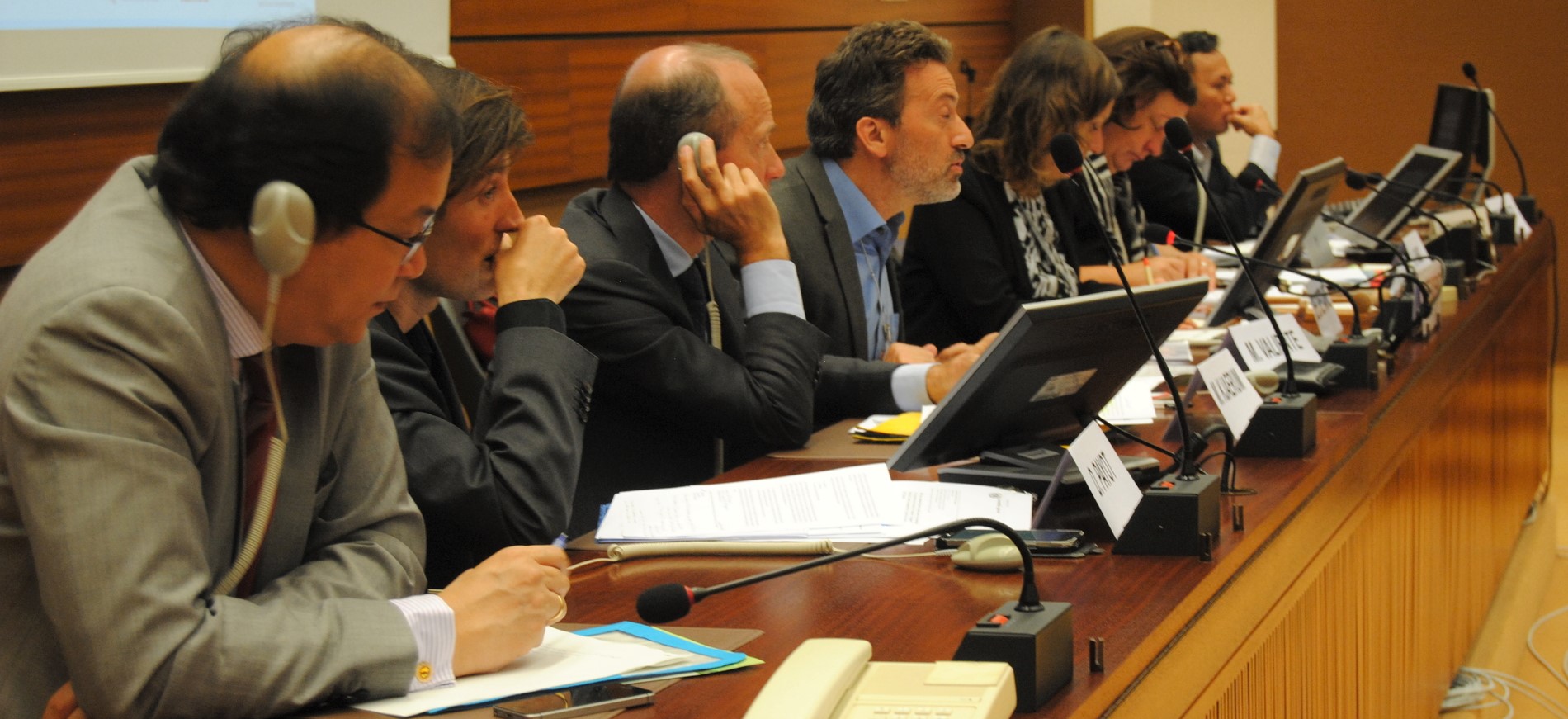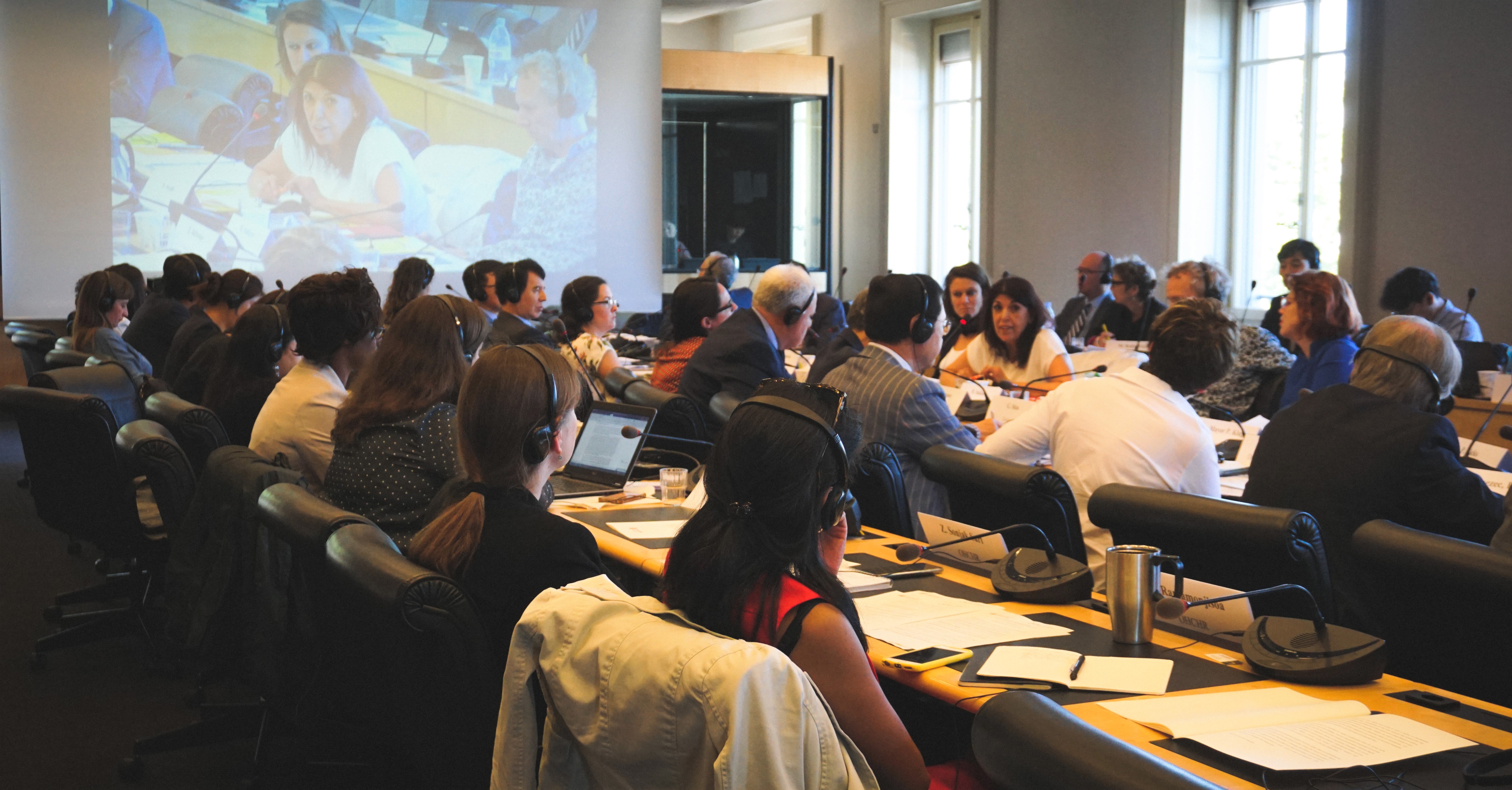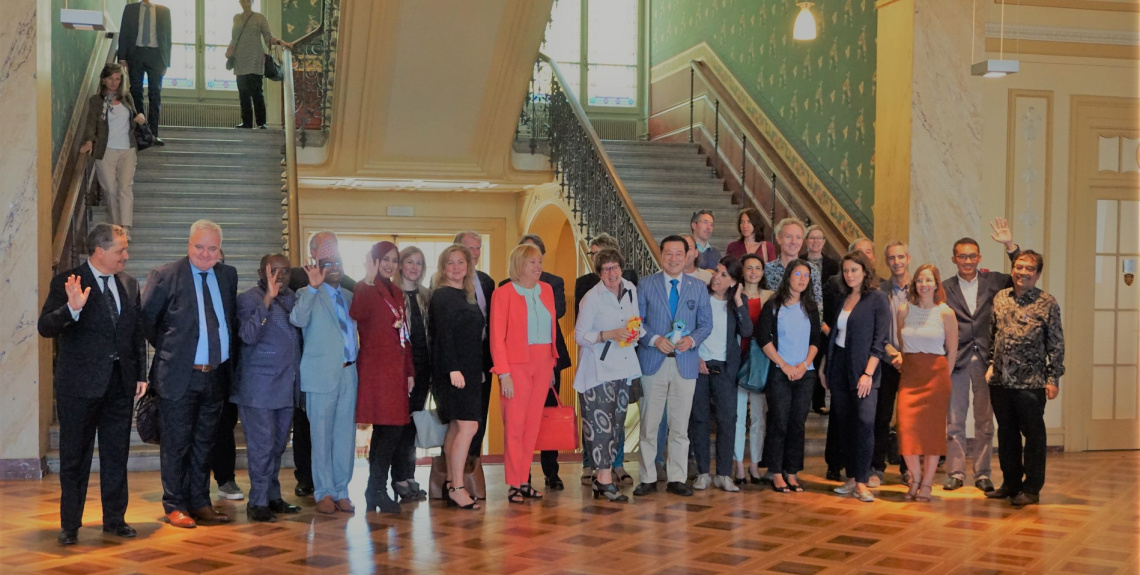The following section offers background information on the process of recognition of local governments’ role in the protection and promotion of human rights by the United Nations and the international community. It dwells also on the initiatives led within this framework by the UCLG Committee on Social Inclusion, Participatory Democracy and Human Rights (UCLG-CSIPDHR) over the last years, which allowed to reinforce partnership between the UN, local governments and United Cities and Local Governments.
[ Click here to know more about "Local Governments and Human Rights" ]
Where do we come from?
The emerging role of local governments in the global protection and promotion of human rights has been recognized recently by the United Nations and nation states within the Human Rights Council. Several international processes (some of them still ongoing) explored the links between international human rights law and local government responsibilities. This process has greatly reinforced local governments’ legitimacy in carrying out their policies in key areas such as non-discrimination and equality, the right to housing, the social inclusion of migrants or participatory democracy.
Outcomes and achievements
This recognition process was initiated after the presentation of A/HRC/30/49 Report to the Human Rights Council (2015) - a document which was originally drafted by the Council’s Advisory Committee. Since then, several statements and working documents have been produced by the Human Rights Council and the Office of the High Commissioner for Human Rights (OHCHR) to give a follow-up to this agenda from a UN perspective – chiefly, Resolution A/HRC/RES/33/8 (2016); Summary of discussions A/HRC/38/22 (2018); Resolution A/HRC/39/L.8 (2018); and A/HRC/42/22 Report (2019).
These documents contributed to mobilize and raise the awareness of the Human Rights Council members - chiefly, national delegations - around the "Local Governments and Human Rights" agenda, while laying the foundation for an enhanced understanding and framing of local governments’ policies, challenges and priorities regarding human rights.
Cooperation between the UN and local actors on human rights includes also the work of civil society and communities.
The role of city-to-city networking
As this process has relied heavily on political debates and knowledge exchange between local and international actors, the UCLG-CSIPDHR has played an important role in bridging these two realities while building comprehensive consensus among local governments from the point of view and expertise of the UCLG World Organization.
In parallel to the official recognition process spearheaded within the Human Rights Council since 2015, members of our Committee also advocated for renewed partnership agreements between UN human rights bodies (chiefly the OHCHR) and the UCLG as representing World Organization of local governments. This relationship allowed, for instance, to enhance political dialogue and joint action between local governments and UN Special Procedures / Special Rapporteurs.
A wide myriad of stakeholders - from international foundations and civil society groups to other city-led initiatives - contributed to reinforce this agenda and foster synergies within the broader human rights cities movement.
Background: The role of the CSIPDHR and UCLG
Before 2015: Drafting of Report A/HRC/30/49
As the Human Rights Council Report on the “Role of Local government in the promotion and the protection of human rights” (A/HRC/30/49) relied on a broad participation of relevant actors in the human rights cities movement, our Committee took part in the drafting process of the same report and facilitated the participation of members.
The priority in opening up this process was to connect local government challenges and priorities with global human rights discussions. This would allow to showcase members’ good practices and foster joint action.
The final version of the Report would recognize the need to secure the participation of local authorities in the drafting of national human rights strategies and policies (21). It also reaffirmed how local authorities should have all necessary powers and financial resources to comply with their human rights responsibilities (22). It also included as positive examples of human rights local implementation the Gwangju Guiding Principles for a Human Rights City and the World Human Rights Cities Forum of Gwangju and the European and Global Charters for Human Rights in the City promoted by UCLG.
2015: UCLG Delegation to the Human Rights Council
In 2015, the CSIPDHR took part in the presentation of the A/HRC/30/49 Report at the Human Rights Council seat in Geneva, were it would be submitted to national delegations attention. Patrick Braouezec (President of Plaine Commune) would represent UCLG on this historical event. In an official statement to the Council, Mr. Braouezec welcomed the Report’s conclusions. He also invited Member State representatives to adopt its recommendations, recalling two conditions for the effective local implementation of human rights: Decentralization and partnership with civil society.
Mr. Braouezec representing the UCLG delegation to the Human Rights Council session discussing A/HRC/30/49 Report
On the same day, the Committee co-organized a side event to present and discuss the Report with representatives of member-states, the United Nations and NGOs. The aim of the event was to raise awareness on local governments’ key role in the promotion and protection of human rights; and to explore ways on how to implement its recommendations.
2016: A landmark resolution by the Human Rights Council
In September 2016, the Committee organized a second delegation to the Human Rights Council led by Barcelona (represented by Human Rights Deputy Director Núria Martínez). On this occasion, our Committee hosted a side event with a view to advance the establishment of UN Guiding Principles on Human Rights Cities. The event focused on assessing the experience and challenges faced by local governments on human rights.
On this same period of sessions, the Council adopted Resolution A/HRC/RES/33/8 recognizing “the role of local government in the promotion and protection of human rights” and that “one of the important functions of local government is to provide public services that address local needs and priorities related to the realization of human rights at the local level”. This was a key landmark, as it expressed directly the point of view of national delegations to the Council.
As a consequence of this resolution, the Council decided to convene, in 2017, a panel discussion on local government and human rights, the objective of which would be “to identify ways in which local government can promote, protect and fulfil human rights effectively, particularly in the context of implementing the 2030 Agenda for Sustainable Development”.
2017: Human Rights Council panel discussion
As a follow-up to the 2016 Council’s statement, the Committee organized a third local government delegation to the Council, this time led by Mauricio Valiente, Madrid’s Deputy Mayor on Human Rights and Historical Memory, and David Payot, Lausanne’s Councilor on neighbourhoods, children and youth. These delegates attended the high level panel convened by the Council on the role of local government in the promotion and protection of human rights.

Side event held during the 2017 local government delegation to Geneva.
A UCLG statement was presented by Mauricio Valiente on behalf of UCLG, welcoming the latest advances by the Human Rights Council. In doing so, he recalled several key conditions for local governments to continue developing this agenda: first, enhanced decentralization schemes with enough competences and resources at local governments’ hands; second, partnership with local governments, their networks and civil society, and to protect local democracy worldwide.
A side event was co-organized by the Committee in collaboration with INFID, ADN21, the Raoul Wallenberg Institute and the Korean Foundation for Human Rights to address local governments’ role and added value in advancing human rights.
While in Geneva, Committee delegates also met with Kate Gilmore, UN Deputy High Commissioner, in order to foster partnership between UCLG and the OHCHR. Particular emphasis was paid on the right to housing and the “Make the Shift” campaign, launched by the UN Special Rapporteur on adequate housing together with UCLG and UN OHCHR.
2018: Towards strengthened partnership with the OHCHR
In 2018, the Human Rights Council saw the presentation of the summary conclusions of 2017 panel discussion on local governments and human rights and the adoption of Resolution A/HRC/39/L.8, which underlined “the expertise and knowledge of local government officials as an important asset in the provision of public services and the promotion and protection of human rights and fundamental freedoms”. This resolution urged the OHCHR to develop a new report on the subject and to continue fostering partnership with local governments and their representing networks on human rights.
In 2018, the CSIPDHR also facilitated the participation of Ms. Kate Gilmore, OHCHR’s Deputy High Commissioner, at the 8th edition of the World Human Rights Cities Forum of Gwangju. This participation was an important breakthrough for the Forum. It contributed to local governments’ taking ownership of their own policies and initiatives in terms of human rights
Keynote intervention to the 2018 WHRCF by the OHCHR's former Deputy High Commissioner, Ms. Kate Gilmore.
The Mayor of Gwangju, as well as representatives from Barcelona, Vienna, São Paulo, Grigny and Amman, were able to present their city practices on human rights to Ms. Gilmore during the Forum. Furthermore, Ms. Gilmore and other representatives from OHCHR Asia’s branch were also welcomed to the seat of the Metropolitan Government of Seoul.
2019-2020: A step forward for the human rights cities movement
In 2019, the OHCHR and UCLG held the first meeting of local governments for human rights in the context of the UN. Mayors and local governments came together in Geneva’s OHCHR seat with key representatives of the UN human rights system. This landmark event identified emerging priorities and potential ways forward to bring about more consolidated forms of partnership between the UN, local governments and UCLG on human rights.
Also in 2019, the OHCHR presented its dedicated report to the issue of local governments and human rights (A/HRC/42/22) which counted with the valuable contribution of local governments and human rights city networking initiatives from across the world. The report gave follow-up to the mandate expressed by the Human Rights Council on this topic.

The 2019 Geneva meeting brought together an unprecedented number of local leaders and practitioners
In 2020, the first year of the COVID-19 pandemic, UCLG and the OHCHR co-organized a second meeting of local governments for human rights which was attended by the new Deputy High Commissioner of the OHCHR, Nada al-Nashif. This high-level meeting was held as a plenary session of the 10th World Human Rights Cities Forum (WHRCF). It reinforced the need to count with a dedicated partnership agreement with the organizations involved.


